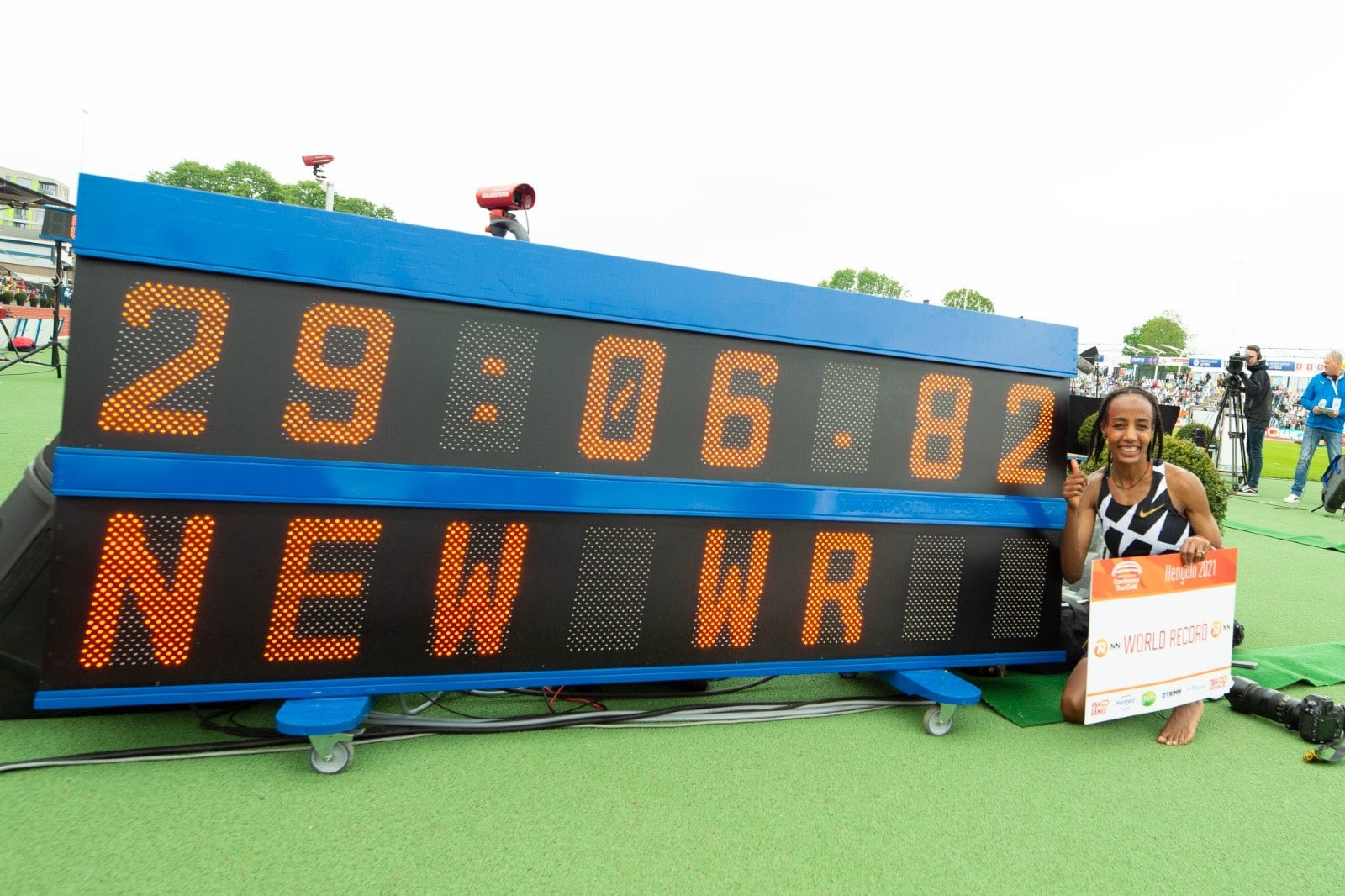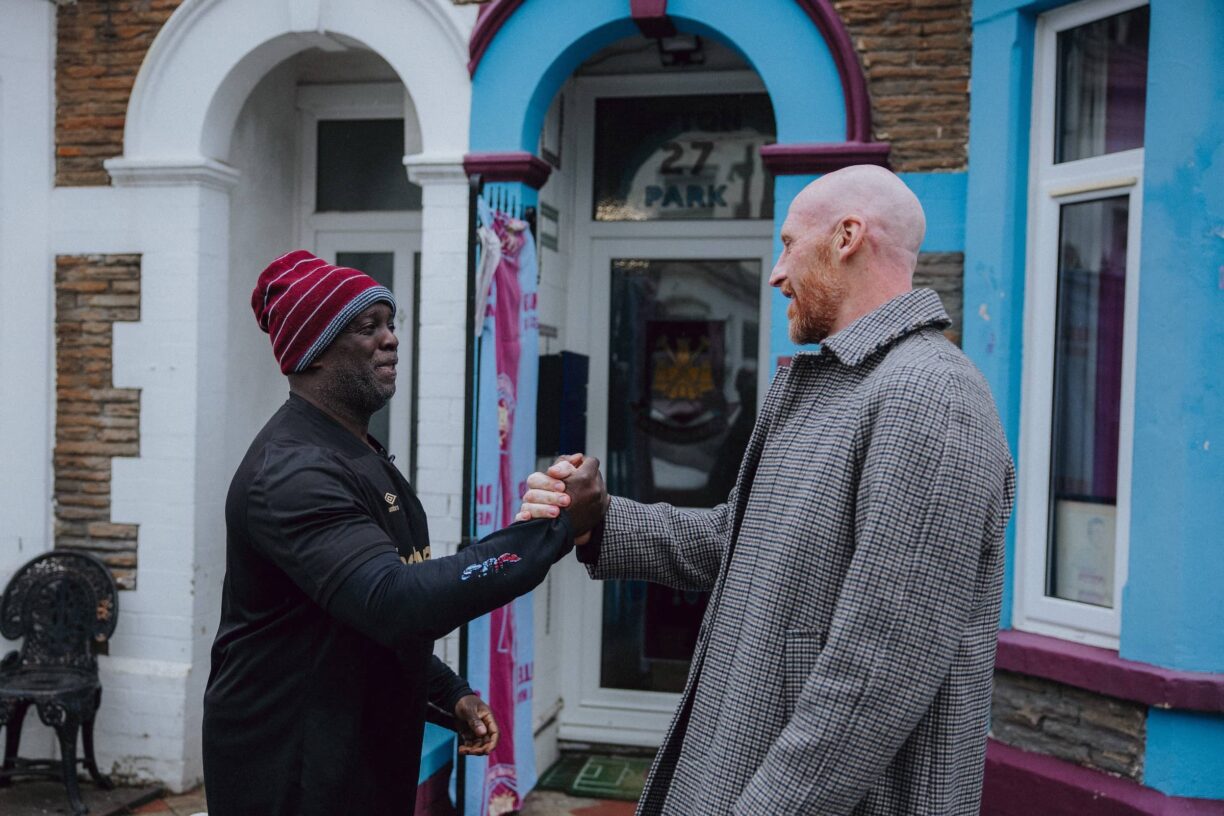There was little about Sifan Hassan’s run at the FBK Games in Hengelo on Sunday (6) that gave the impression she was being patient. Eyes firmly fixed on the track ahead, her arms pumping and legs turning with incredible consistency, she looked like a person who had places to be – and fast.
But, at the same time, she seemed calm and in control. Despite traveling at a pace of 2:55 per kilometre for the majority of her 10,000m, there was no fluster or signs of the tiredness that she later revealed had gripped her in the early stages. Hassan was flowing towards the finish line, where – 29 minutes and six seconds after she started – her world record ambition would be realised. Inside, the Dutch 28-year-old was giving herself a stern talking to.
“Having travelled from America, I had jet lag and I felt terrible at the beginning,” Hassan revealed. “Everything felt heavy, but I just tried to hang on to the lights. Sometimes I accidentally passed them, and I thought ‘no, calm down! Be patient.’”
The lights she describes formed part of the Wavelight technology used at the Fanny Blankers-Koen Stadion during the World Athletics Continental Tour Gold meeting in the Dutch city, programmed to highlight the pace needed to improve the world 10,000m record of 29:17.45 which had been set by Ethiopia’s Almaz Ayana at the 2016 Olympic Games in Rio.
The blue lights showed world record tempo, while the green indicated the speed of Hassan’s own European record of 29:36.67 run on the same track eight months earlier. Ultimately, the double world champion’s patience paid off, as she waited until the final kilometre to move away from those bulbs. Then it was Hassan’s turn to light the way, and she reached her destination in a time of 29:06.82.
PROFILE
Sifan Hassan
Born: 1 January 1993. Coach: Tim Rowberry
Born in Adama, Ethiopia, in 1993, Hassan left her homeland as a refugee in 2008, arriving in the Netherlands at age 15. She began running soon thereafter and less than a decade later had produced a record of extraordinary range that would rank her among the finest middle and long distance runners of all-time.
Her rise into the global ranks began in December 2013 with her European U23 cross country title, one month after gaining Dutch citizenship. Her appearances on continental and global podiums haven’t stopped since.
The following July she signalled herself as a rising 1500m force, clocking 3:57.00 to win the Paris leg of the Diamond League. Her big stage breakthrough came a month later at the 2014 European Championships in Zurich where she took gold in the 1500m and silver in the 5000m.
In 2015, she took the European indoor 1500m title and bronze over the distance at the World Athletics Championships in Beijing. Her first global title came at the 2016 World Indoor Championships in Portland where she raced to victory in the 1500m. Hassan finished fifth in the Olympic 1500m final in Rio, and fifth again at the World Championships in London.
In 2018 she improved her proficiency over longer distances, clocking 14:22.34 to break the European 5000m record in Rabat in July and 1:05:15 for the half marathon in Copenhagen in September, another area record. That came just a month after she took the European 5000m title and eight days after she sped to an 8:27.50 3000m victory at the Continental Cup in Ostrava, the fastest time in the world that season.
Her momentum continued in 2019. In her first race of the year, she set a world record for 5km on the road, clocking 14:44 in Monaco. She then broke the European 3000m record at the Prefontaine Classic in June, clocking 8:18.48, the fastest time in the world since 1993. Twelve days later, she improved her own national 1500m record in Rabat, clocking 3:55.93 – a mark which she lowered to 3:55.30 en route to a 4:12.33 mile to break a world record which had stood for 23 years. And later that month she ran 14:22.12 for a European 5000m record in London.
The best that year was yet to come, however, and in Doha she became the first to achieve a world 1500m and 10,000m double, claiming her 10,000m win on 28 September and her 1500m victory, in a European record of 3:51.95, seven days later.
In 2020, despite limited racing opportunities, Hassan set a world record in the one-hour event, covering 18,930km in Brussels on 4 September, and the following month she ran 29:36.67 in the rain in Hengelo to break Paula Radcliffe’s 18-year-old European 10,000m record. Back on the same track eight months later, Hassan revised her best for 25 laps to 29:06.82, smashing Almaz Ayana’s world record from the 2016 Olympics in Rio by more than 10 seconds.
STATS
Sifan Hassan’s personal bests
800m: 1:56.81 (2017)
1000m: 2:34.68 (2015)
1500m: 3:51.95 (2019) European record
Mile: 4:12.33 (2019) world record
3000m: 8:18.49 (2019) European record
5000m: 14:22.12 (2019) European record
10,000m: 29:06.82 (2021) world record*
One hour: 18,930km (2020) world record
5km: 14:44 (2019) women-only world record
Half marathon: 1:05:15 (2018) European record
World all-time women’s 10,000m top 10
29:06.82 Sifan Hassan (NED) Hengelo, 6 Jun 2021
29:17.45 Almaz Ayana (ETH) Rio de Janeiro, 12 Aug 2016
29:31.78 Wang Junxia (CHN) Beijing, 8 Sep 1993
29:32.53 Vivian Cheruiyot (KEN) Rio de Janeiro, 12 Aug 2016
29:39.42 Gudaf Tsegay (ETH) Maia, 8 May 2021
29:42.56 Tirunesh Dibaba (ETH) Rio de Janeiro, 12 Aug 2016
29:50.77 Kalkidan Gezahegne (BRN) Maia, 8 May 2021
29:53.51 Alice Aprot Nawowuna (KEN) Rio de Janeiro, 12 Aug 2016
29:53.80 Meselech Melkamu (ETH) Utrecht, 14 Jun 2009
29:59.20 Meseret Defar (ETH) Birmingham, 11 Jul 2009
Women’s 10,000m world record progression
32:17.20 Yelena Sipatova (URS) Moscow, 16 Sep 1981
31:35.3h Mary Tabb (USA) Eugene, 16 Jul 1982
31:35.01 Lyudmila Baranova (URS) Krasnodar, 29 May 1983
31:27.58 Raisa Sadreydinova (URS) Odessa, 7 Sep 1983
31:13.78 Olga Bondarenko (URS) Kiev, 24 Jun 1984
30:59.42 Ingrid Kristiansen (NOR) Oslo, 27 Jul 1985
30:13.74 Ingrid Kristiansen (NOR) Oslo, 5 Jul 1986
29:31.78 Wang Junxia (CHN) Beijing, 8 Sep 1993
29:17.45 Almaz Ayana (ETH) Rio de Janeiro, 12 Aug 2016
29:06.82 Sifan Hassan (NED) Hengelo, 6 Jun 2021*
*Subject to the usual ratification procedure





